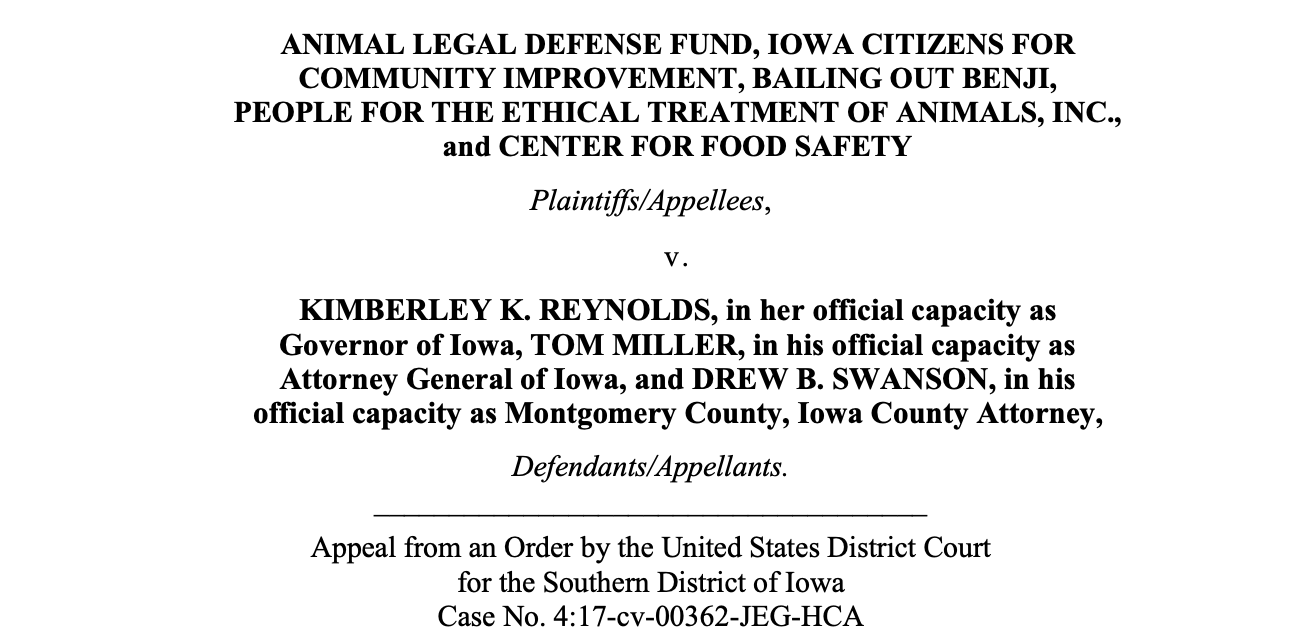Iowa ‘ag-gag’ statute violates First Amendment

On June 27, the Reporters Committee for Freedom of the Press and a coalition of 22 media organizations filed a friend-of-the-court brief supporting efforts to challenge an “ag-gag” statute in Iowa.
The case concerns Iowa Code 717A.3A — known as the “ag-gag” law — which criminalizes making a false statement or representation in order to obtain access to or employment at an agricultural production facility. The brief — written by Lisa B. Zycherman at Davis Wright Tremaine, who represented the media coalition in the case — argues that the statute criminalizes “a number of constitutionally-protected newsgathering activities.”
In its brief, the media coalition notes that journalists rely on sources — including activists and members of the public — to “take jobs intending to carry out their employment responsibilities and also observe practices to inform the public.”
However, statutes like this one, that criminalize disclosures to the press, chill reporter-source relationships, the brief argues. Consequently, the chilling effect prevents news organizations from informing the public about the nation’s food supply.
The brief argues that Iowa’s ag-gag statute prevents both agricultural workers and the media from engaging in First Amendment-protected activities.
“Agricultural workers who witness unsafe agricultural practices and abuse at Iowa agricultural facilities want to disclose information to the general public,” the brief explains. “At the same time, the media want to inform the public about the safety of the nation’s food supply and the potential for animal and worker abuses.”
The media coalition’s brief also stressed that the law’s conspiracy provision amplifies its chilling effect, given the potential for journalists to be held criminally liable for working with sources to learn more about agricultural facilities. These reporter-source relationships are an important part of the media’s ability to fulfill its independent oversight role, the brief argues, adding that “members of the public cannot themselves monitor all of the agricultural facilities that produce their food.”
According to the brief, the statue also “stifles public debate, discourages whistleblowers from coming forward in fear of prosecution, and values profits and ‘property rights’ over the public’s health and safety.”
“Many investigative reports rely on first-hand accounts, documents, photographs, or videos obtained from sources within a government entity, a company, or other organizations,” the brief reads.
The brief also asserts that the statute “was adopted in reaction to undercover investigations and resulting media coverage that cast an unwanted spotlight on Iowa’s agricultural industry.”
Such legislative action “premised on stifling public interest journalism,” the brief argues, “unquestionably” violates the First Amendment.
Read the Reporters Committee’s brief. Read the defendants’ opening brief and the plaintiff’s response brief.
The Reporters Committee regularly files friend-of-the-court briefs and its attorneys represent journalists and news organizations pro bono in court cases that involve First Amendment freedoms, the newsgathering rights of journalists and access to public information. Stay up-to-date on our work by signing up for our monthly newsletter and following us on Twitter or Instagram.